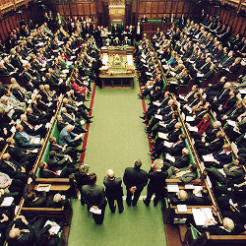Chris White MP has welcomed the removal of the term ‘social enterprise’ from his private member's bill on public services, though he and new shadow minister for civil society Gareth Thomas have expressed disappointment that strategies to promote social enterprises will also be removed.
The Public Services Bill, which will require councils to commission services that add economic, social or environmental value, rather than simply cost the least, passed the Committee stage in Parliament yesterday after a two-hour debate by MPs.
During the debate, minister for civil society Nick Hurd successfully passed amendments to the Bill on behalf of the government, which would remove the term ‘social enterprise’ from the Bill’s title, and remove social enterprise strategies from the Bill.
Chris White MP who opened the debate said he appreciated that his Bill should be called Public Services (Social Value) Bill as it focused on the most important part of the Bill and provided a snappy title.
However, White seemed less happy that social enterprise strategies, which would require public bodies to develop strategies to promote social enterprise, would be removed from the Bill:
“I hope that the message sent out by the Bill will be that local authorities should be fully open when consulting social enterprises and keep them in mind when looking at their local economies and public services,” he said. “I must accept that the strategies might have placed too much of a burden on local authorities when we are asking them to cut costs and focus.”
Later in the debate, newly-appointed shadow minister for civil society Gareth Thomas was more vocal in his opposition to the amendments concerning social enterprises:
“The idea that a social enterprise strategy would be a huge burden on Whitehall or on local authorities is a little far-fetched,” he said. "This and changing the Bill’s title would gut many of the potentially huge wins that the Bill might deliver.”
However, Hurd insisted throughout the debate that legislating to require central and local government to produce social enterprise strategies would be too bureaucratic.
“I fear that we would lose something in that process,” he said. “If this just becomes a bureaucratic function that everyone has to do, there is a danger we will be working against ourselves.”
The Bill, which has cross-party support, now moves to the Report stage.
Peter Holbrook, Social Enterprise UK’s chief executive, said:“There’s so much support for this Bill, which is likely why today’s debate didn’t take very long. Here’s a Bill that could grow the number of social enterprises and charities delivering public services when the cuts are hitting the third sector hard with devastating effects for the people and communities they serve. It’s a no brainer. This is an opportunity for the country’s leaders to prove that they’re serious about the Big Society as a policy.
“Some amendments have been made, like removing the words ‘social enterprise’ from the Bill’s title, but most importantly this legislation would embed social value into the procurement process. Social enterprises and charities would still be competing with private sector providers who too would be asked to add social or environmental value.”








